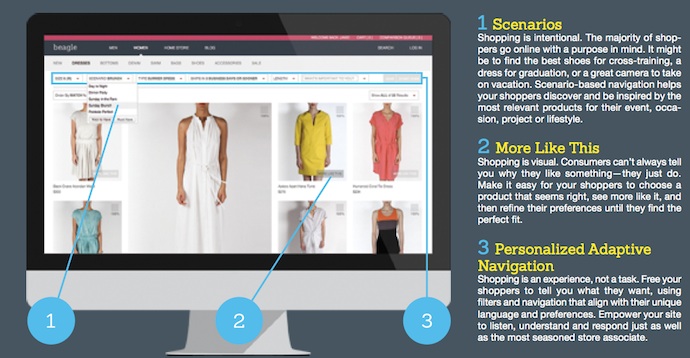Edgecase is trying to make the online shopping experience friendlier and smarter — closer, perhaps, to what it’s like to shop with a salesperson who understands your needs and is totally knowledgeable about what’s in-stock.
The company was previously known as Compare Metrics, but it’s relaunching today with a new name and an upgraded product.
To describe the problem that Edgecase is trying to solve, co-founder and CEO Garrett Eastham noted that the conversion rates (i.e., the percentage of visitors who actually buy something) of online stores lag badly behind those of physical stores, something he attributed to the fact that “today’s digital commerce platforms were designed by database engineers not shoppers.”
Lisa Roberts, the company’s vice president of product and marketing, added that when you’re navigating most online retailers, your options are limited to browsing by brand, size, price, and not much more. That works if you pretty much know what you’re looking for, but it’s less helpful if you only have a vague idea of what you need, or no idea at wall — in other words, when you’re doing the online equivalent of window shopping.
So Edgecase works with online shopping sites to rethink their navigation experience. For one thing, it allows shoppers to get a lot more detail about what they want, in something closer to everyday language — instead of saying they’re looking for a dress from Brand X in Size Y, they can say they want a short, black cocktail dress. Or they can browse based on the occasion that they’re shopping for, like a wedding or a graduation, Edgecase will automatically enter a set of relevant attributes. (You can see these features in action in the demo videEos embedded throughout the post.)
As you browse an Edgecase-powered site, there are other touches that improve the experience. For example, as you change your filters, the results will update immediately, so you can tell whether or not you’re moving in the right direction. You can also specify whether one of the attributes is an essential “need to have” or just something that you’d like (so if there’s an item that hits most of your high points but misses on something less important, it won’t be excluded.) And if you see something you like, but you can’t quite articulate why, you can just hit the “more like this” button and you’ll be shown similar items.
Eastham said Edgecase can achieve this through a combination of machine learning and human curation. Most of this product information is already available, but Edgecase’s technology can actually structure all the relevant data that’s floating around, and “the human layer” can make sure the data is presented in the language that shoppers actually use.
He also noted that Edgecase integrates with existing e-commerce search tools like Endecca and Solar, and that it’s working on mobile capabilities, too.
Edgecase customers include Crate & Barrel, Wasserstrom, Urban Decay, Golfsmith, Kate Somerville, and Rebecca Minkoff. The company says that it was able to improve conversion rates for makeup retailer Urban Decay by 16 percent.
The company has raised $8M in funding from Allegro Ventures, Austin Ventures, Floodgate, Hurt Family Investments, Mack Capital, and various angel investors.
